Reflective Analysis: Orientation for Success in Higher Education
VerifiedAdded on 2023/06/07
|9
|2109
|142
Essay
AI Summary
This essay provides a reflective analysis on achieving success in higher education, focusing on the importance of reflective learning and continuous personal development. It delves into Gibb's reflective cycle, explaining its various stages and how they contribute to effective learning and problem-solving. The essay also examines the roles of feedback and feed-forward in enhancing student performance, highlighting their differences and combined impact on learning. Furthermore, it discusses the significance of creating and managing effective academic strategies and the role of motivation in student success. The analysis concludes that reflective learning, combined with constructive feedback mechanisms, is crucial for students to understand their strengths and weaknesses, ultimately leading to improved academic outcomes. The essay also emphasizes the importance of feed-forward methods in systematically managing futuristic programs, and is available for students to study as an example on Desklib, a platform offering a range of study tools and resources.
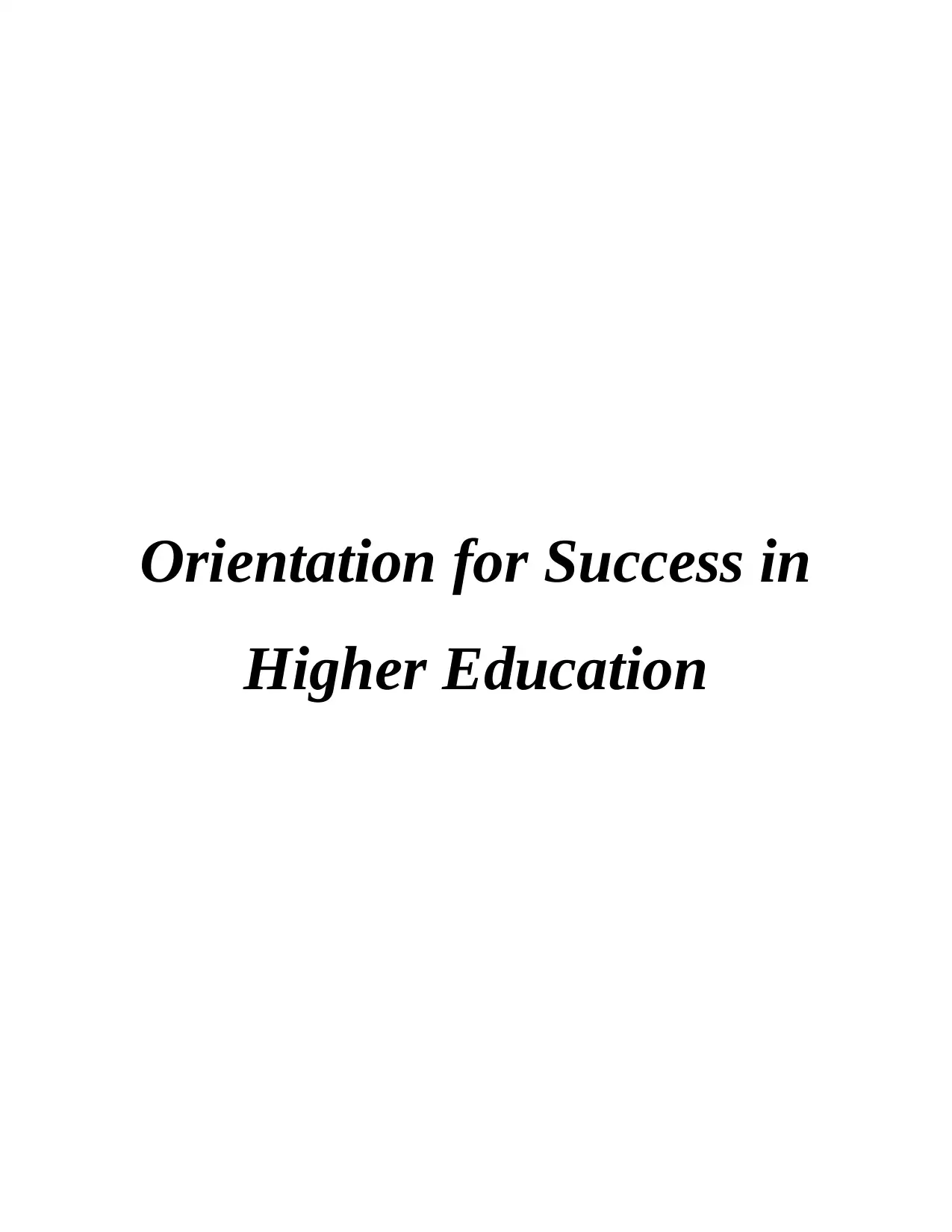
Orientation for Success in
Higher Education
Higher Education
Paraphrase This Document
Need a fresh take? Get an instant paraphrase of this document with our AI Paraphraser
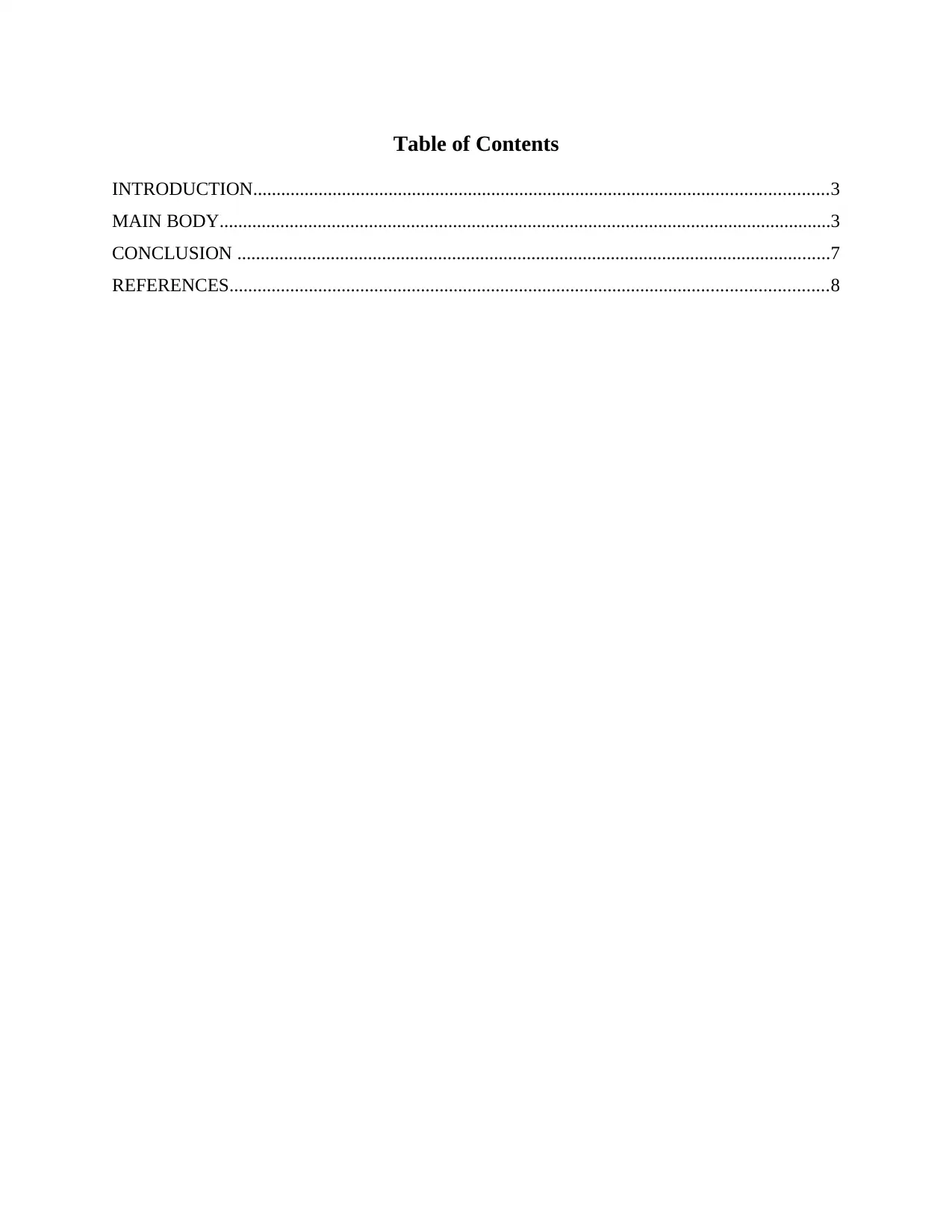
Table of Contents
INTRODUCTION...........................................................................................................................3
MAIN BODY...................................................................................................................................3
CONCLUSION ...............................................................................................................................7
REFERENCES................................................................................................................................8
INTRODUCTION...........................................................................................................................3
MAIN BODY...................................................................................................................................3
CONCLUSION ...............................................................................................................................7
REFERENCES................................................................................................................................8
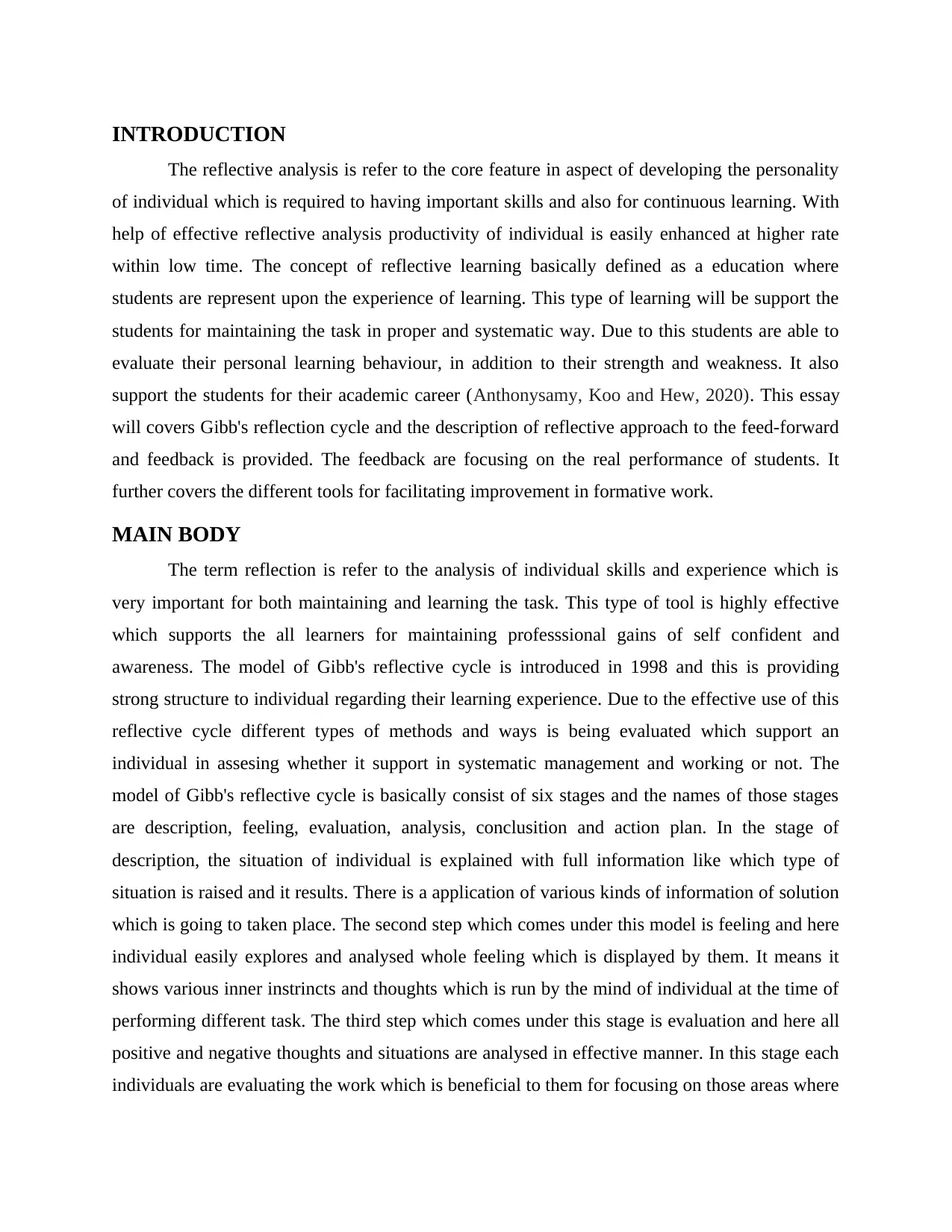
INTRODUCTION
The reflective analysis is refer to the core feature in aspect of developing the personality
of individual which is required to having important skills and also for continuous learning. With
help of effective reflective analysis productivity of individual is easily enhanced at higher rate
within low time. The concept of reflective learning basically defined as a education where
students are represent upon the experience of learning. This type of learning will be support the
students for maintaining the task in proper and systematic way. Due to this students are able to
evaluate their personal learning behaviour, in addition to their strength and weakness. It also
support the students for their academic career (Anthonysamy, Koo and Hew, 2020). This essay
will covers Gibb's reflection cycle and the description of reflective approach to the feed-forward
and feedback is provided. The feedback are focusing on the real performance of students. It
further covers the different tools for facilitating improvement in formative work.
MAIN BODY
The term reflection is refer to the analysis of individual skills and experience which is
very important for both maintaining and learning the task. This type of tool is highly effective
which supports the all learners for maintaining professsional gains of self confident and
awareness. The model of Gibb's reflective cycle is introduced in 1998 and this is providing
strong structure to individual regarding their learning experience. Due to the effective use of this
reflective cycle different types of methods and ways is being evaluated which support an
individual in assesing whether it support in systematic management and working or not. The
model of Gibb's reflective cycle is basically consist of six stages and the names of those stages
are description, feeling, evaluation, analysis, conclusition and action plan. In the stage of
description, the situation of individual is explained with full information like which type of
situation is raised and it results. There is a application of various kinds of information of solution
which is going to taken place. The second step which comes under this model is feeling and here
individual easily explores and analysed whole feeling which is displayed by them. It means it
shows various inner instrincts and thoughts which is run by the mind of individual at the time of
performing different task. The third step which comes under this stage is evaluation and here all
positive and negative thoughts and situations are analysed in effective manner. In this stage each
individuals are evaluating the work which is beneficial to them for focusing on those areas where
The reflective analysis is refer to the core feature in aspect of developing the personality
of individual which is required to having important skills and also for continuous learning. With
help of effective reflective analysis productivity of individual is easily enhanced at higher rate
within low time. The concept of reflective learning basically defined as a education where
students are represent upon the experience of learning. This type of learning will be support the
students for maintaining the task in proper and systematic way. Due to this students are able to
evaluate their personal learning behaviour, in addition to their strength and weakness. It also
support the students for their academic career (Anthonysamy, Koo and Hew, 2020). This essay
will covers Gibb's reflection cycle and the description of reflective approach to the feed-forward
and feedback is provided. The feedback are focusing on the real performance of students. It
further covers the different tools for facilitating improvement in formative work.
MAIN BODY
The term reflection is refer to the analysis of individual skills and experience which is
very important for both maintaining and learning the task. This type of tool is highly effective
which supports the all learners for maintaining professsional gains of self confident and
awareness. The model of Gibb's reflective cycle is introduced in 1998 and this is providing
strong structure to individual regarding their learning experience. Due to the effective use of this
reflective cycle different types of methods and ways is being evaluated which support an
individual in assesing whether it support in systematic management and working or not. The
model of Gibb's reflective cycle is basically consist of six stages and the names of those stages
are description, feeling, evaluation, analysis, conclusition and action plan. In the stage of
description, the situation of individual is explained with full information like which type of
situation is raised and it results. There is a application of various kinds of information of solution
which is going to taken place. The second step which comes under this model is feeling and here
individual easily explores and analysed whole feeling which is displayed by them. It means it
shows various inner instrincts and thoughts which is run by the mind of individual at the time of
performing different task. The third step which comes under this stage is evaluation and here all
positive and negative thoughts and situations are analysed in effective manner. In this stage each
individuals are evaluating the work which is beneficial to them for focusing on those areas where
⊘ This is a preview!⊘
Do you want full access?
Subscribe today to unlock all pages.

Trusted by 1+ million students worldwide
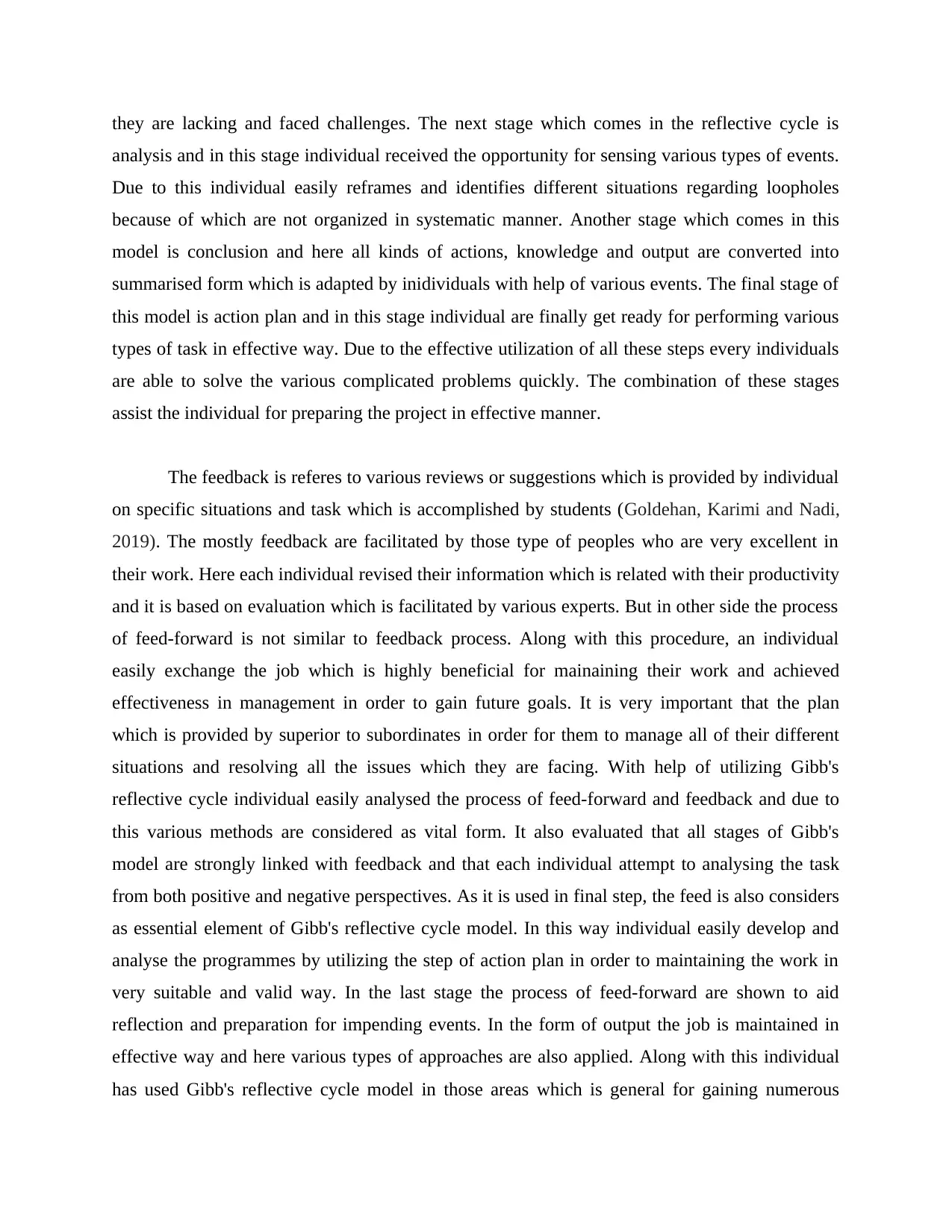
they are lacking and faced challenges. The next stage which comes in the reflective cycle is
analysis and in this stage individual received the opportunity for sensing various types of events.
Due to this individual easily reframes and identifies different situations regarding loopholes
because of which are not organized in systematic manner. Another stage which comes in this
model is conclusion and here all kinds of actions, knowledge and output are converted into
summarised form which is adapted by inidividuals with help of various events. The final stage of
this model is action plan and in this stage individual are finally get ready for performing various
types of task in effective way. Due to the effective utilization of all these steps every individuals
are able to solve the various complicated problems quickly. The combination of these stages
assist the individual for preparing the project in effective manner.
The feedback is referes to various reviews or suggestions which is provided by individual
on specific situations and task which is accomplished by students (Goldehan, Karimi and Nadi,
2019). The mostly feedback are facilitated by those type of peoples who are very excellent in
their work. Here each individual revised their information which is related with their productivity
and it is based on evaluation which is facilitated by various experts. But in other side the process
of feed-forward is not similar to feedback process. Along with this procedure, an individual
easily exchange the job which is highly beneficial for mainaining their work and achieved
effectiveness in management in order to gain future goals. It is very important that the plan
which is provided by superior to subordinates in order for them to manage all of their different
situations and resolving all the issues which they are facing. With help of utilizing Gibb's
reflective cycle individual easily analysed the process of feed-forward and feedback and due to
this various methods are considered as vital form. It also evaluated that all stages of Gibb's
model are strongly linked with feedback and that each individual attempt to analysing the task
from both positive and negative perspectives. As it is used in final step, the feed is also considers
as essential element of Gibb's reflective cycle model. In this way individual easily develop and
analyse the programmes by utilizing the step of action plan in order to maintaining the work in
very suitable and valid way. In the last stage the process of feed-forward are shown to aid
reflection and preparation for impending events. In the form of output the job is maintained in
effective way and here various types of approaches are also applied. Along with this individual
has used Gibb's reflective cycle model in those areas which is general for gaining numerous
analysis and in this stage individual received the opportunity for sensing various types of events.
Due to this individual easily reframes and identifies different situations regarding loopholes
because of which are not organized in systematic manner. Another stage which comes in this
model is conclusion and here all kinds of actions, knowledge and output are converted into
summarised form which is adapted by inidividuals with help of various events. The final stage of
this model is action plan and in this stage individual are finally get ready for performing various
types of task in effective way. Due to the effective utilization of all these steps every individuals
are able to solve the various complicated problems quickly. The combination of these stages
assist the individual for preparing the project in effective manner.
The feedback is referes to various reviews or suggestions which is provided by individual
on specific situations and task which is accomplished by students (Goldehan, Karimi and Nadi,
2019). The mostly feedback are facilitated by those type of peoples who are very excellent in
their work. Here each individual revised their information which is related with their productivity
and it is based on evaluation which is facilitated by various experts. But in other side the process
of feed-forward is not similar to feedback process. Along with this procedure, an individual
easily exchange the job which is highly beneficial for mainaining their work and achieved
effectiveness in management in order to gain future goals. It is very important that the plan
which is provided by superior to subordinates in order for them to manage all of their different
situations and resolving all the issues which they are facing. With help of utilizing Gibb's
reflective cycle individual easily analysed the process of feed-forward and feedback and due to
this various methods are considered as vital form. It also evaluated that all stages of Gibb's
model are strongly linked with feedback and that each individual attempt to analysing the task
from both positive and negative perspectives. As it is used in final step, the feed is also considers
as essential element of Gibb's reflective cycle model. In this way individual easily develop and
analyse the programmes by utilizing the step of action plan in order to maintaining the work in
very suitable and valid way. In the last stage the process of feed-forward are shown to aid
reflection and preparation for impending events. In the form of output the job is maintained in
effective way and here various types of approaches are also applied. Along with this individual
has used Gibb's reflective cycle model in those areas which is general for gaining numerous
Paraphrase This Document
Need a fresh take? Get an instant paraphrase of this document with our AI Paraphraser
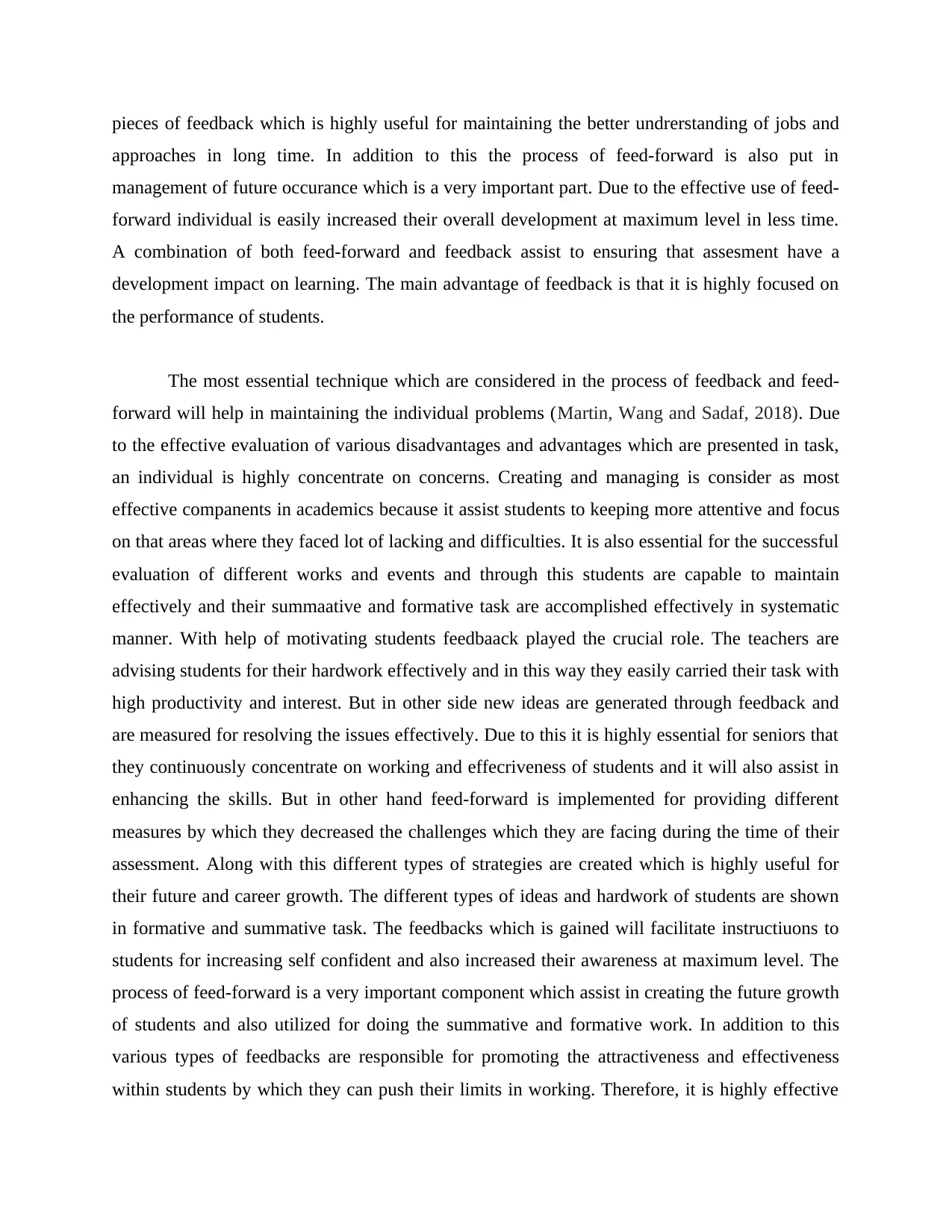
pieces of feedback which is highly useful for maintaining the better undrerstanding of jobs and
approaches in long time. In addition to this the process of feed-forward is also put in
management of future occurance which is a very important part. Due to the effective use of feed-
forward individual is easily increased their overall development at maximum level in less time.
A combination of both feed-forward and feedback assist to ensuring that assesment have a
development impact on learning. The main advantage of feedback is that it is highly focused on
the performance of students.
The most essential technique which are considered in the process of feedback and feed-
forward will help in maintaining the individual problems (Martin, Wang and Sadaf, 2018). Due
to the effective evaluation of various disadvantages and advantages which are presented in task,
an individual is highly concentrate on concerns. Creating and managing is consider as most
effective companents in academics because it assist students to keeping more attentive and focus
on that areas where they faced lot of lacking and difficulties. It is also essential for the successful
evaluation of different works and events and through this students are capable to maintain
effectively and their summaative and formative task are accomplished effectively in systematic
manner. With help of motivating students feedbaack played the crucial role. The teachers are
advising students for their hardwork effectively and in this way they easily carried their task with
high productivity and interest. But in other side new ideas are generated through feedback and
are measured for resolving the issues effectively. Due to this it is highly essential for seniors that
they continuously concentrate on working and effecriveness of students and it will also assist in
enhancing the skills. But in other hand feed-forward is implemented for providing different
measures by which they decreased the challenges which they are facing during the time of their
assessment. Along with this different types of strategies are created which is highly useful for
their future and career growth. The different types of ideas and hardwork of students are shown
in formative and summative task. The feedbacks which is gained will facilitate instructiuons to
students for increasing self confident and also increased their awareness at maximum level. The
process of feed-forward is a very important component which assist in creating the future growth
of students and also utilized for doing the summative and formative work. In addition to this
various types of feedbacks are responsible for promoting the attractiveness and effectiveness
within students by which they can push their limits in working. Therefore, it is highly effective
approaches in long time. In addition to this the process of feed-forward is also put in
management of future occurance which is a very important part. Due to the effective use of feed-
forward individual is easily increased their overall development at maximum level in less time.
A combination of both feed-forward and feedback assist to ensuring that assesment have a
development impact on learning. The main advantage of feedback is that it is highly focused on
the performance of students.
The most essential technique which are considered in the process of feedback and feed-
forward will help in maintaining the individual problems (Martin, Wang and Sadaf, 2018). Due
to the effective evaluation of various disadvantages and advantages which are presented in task,
an individual is highly concentrate on concerns. Creating and managing is consider as most
effective companents in academics because it assist students to keeping more attentive and focus
on that areas where they faced lot of lacking and difficulties. It is also essential for the successful
evaluation of different works and events and through this students are capable to maintain
effectively and their summaative and formative task are accomplished effectively in systematic
manner. With help of motivating students feedbaack played the crucial role. The teachers are
advising students for their hardwork effectively and in this way they easily carried their task with
high productivity and interest. But in other side new ideas are generated through feedback and
are measured for resolving the issues effectively. Due to this it is highly essential for seniors that
they continuously concentrate on working and effecriveness of students and it will also assist in
enhancing the skills. But in other hand feed-forward is implemented for providing different
measures by which they decreased the challenges which they are facing during the time of their
assessment. Along with this different types of strategies are created which is highly useful for
their future and career growth. The different types of ideas and hardwork of students are shown
in formative and summative task. The feedbacks which is gained will facilitate instructiuons to
students for increasing self confident and also increased their awareness at maximum level. The
process of feed-forward is a very important component which assist in creating the future growth
of students and also utilized for doing the summative and formative work. In addition to this
various types of feedbacks are responsible for promoting the attractiveness and effectiveness
within students by which they can push their limits in working. Therefore, it is highly effective

for seniors to provide feed-forward and feedback to students on regular basis in order to
improving the productivity of students. Feedforward also refers to 'timely and constructive
feedback' that feeds into the next assignment
improving the productivity of students. Feedforward also refers to 'timely and constructive
feedback' that feeds into the next assignment
⊘ This is a preview!⊘
Do you want full access?
Subscribe today to unlock all pages.

Trusted by 1+ million students worldwide
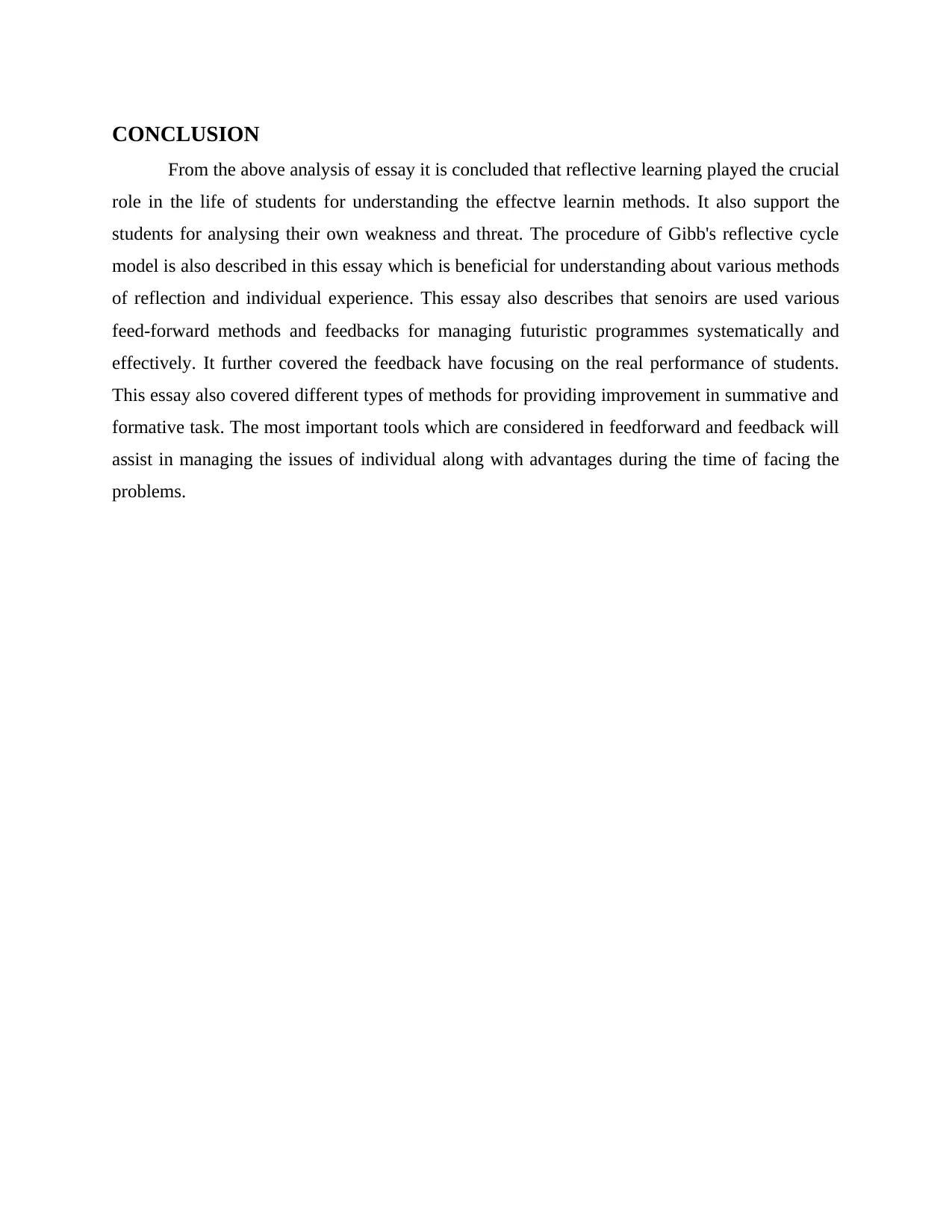
CONCLUSION
From the above analysis of essay it is concluded that reflective learning played the crucial
role in the life of students for understanding the effectve learnin methods. It also support the
students for analysing their own weakness and threat. The procedure of Gibb's reflective cycle
model is also described in this essay which is beneficial for understanding about various methods
of reflection and individual experience. This essay also describes that senoirs are used various
feed-forward methods and feedbacks for managing futuristic programmes systematically and
effectively. It further covered the feedback have focusing on the real performance of students.
This essay also covered different types of methods for providing improvement in summative and
formative task. The most important tools which are considered in feedforward and feedback will
assist in managing the issues of individual along with advantages during the time of facing the
problems.
From the above analysis of essay it is concluded that reflective learning played the crucial
role in the life of students for understanding the effectve learnin methods. It also support the
students for analysing their own weakness and threat. The procedure of Gibb's reflective cycle
model is also described in this essay which is beneficial for understanding about various methods
of reflection and individual experience. This essay also describes that senoirs are used various
feed-forward methods and feedbacks for managing futuristic programmes systematically and
effectively. It further covered the feedback have focusing on the real performance of students.
This essay also covered different types of methods for providing improvement in summative and
formative task. The most important tools which are considered in feedforward and feedback will
assist in managing the issues of individual along with advantages during the time of facing the
problems.
Paraphrase This Document
Need a fresh take? Get an instant paraphrase of this document with our AI Paraphraser
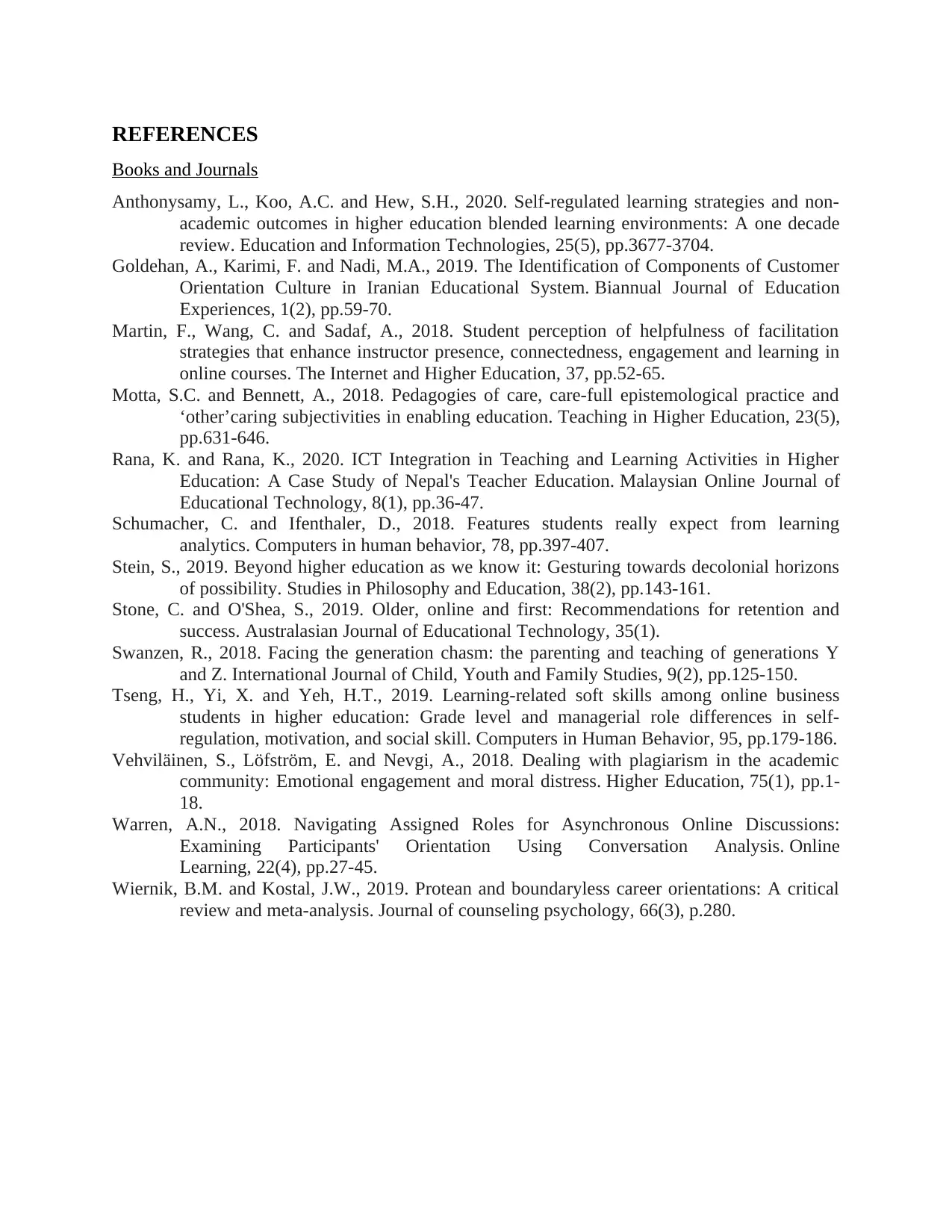
REFERENCES
Books and Journals
Anthonysamy, L., Koo, A.C. and Hew, S.H., 2020. Self-regulated learning strategies and non-
academic outcomes in higher education blended learning environments: A one decade
review. Education and Information Technologies, 25(5), pp.3677-3704.
Goldehan, A., Karimi, F. and Nadi, M.A., 2019. The Identification of Components of Customer
Orientation Culture in Iranian Educational System. Biannual Journal of Education
Experiences, 1(2), pp.59-70.
Martin, F., Wang, C. and Sadaf, A., 2018. Student perception of helpfulness of facilitation
strategies that enhance instructor presence, connectedness, engagement and learning in
online courses. The Internet and Higher Education, 37, pp.52-65.
Motta, S.C. and Bennett, A., 2018. Pedagogies of care, care-full epistemological practice and
‘other’caring subjectivities in enabling education. Teaching in Higher Education, 23(5),
pp.631-646.
Rana, K. and Rana, K., 2020. ICT Integration in Teaching and Learning Activities in Higher
Education: A Case Study of Nepal's Teacher Education. Malaysian Online Journal of
Educational Technology, 8(1), pp.36-47.
Schumacher, C. and Ifenthaler, D., 2018. Features students really expect from learning
analytics. Computers in human behavior, 78, pp.397-407.
Stein, S., 2019. Beyond higher education as we know it: Gesturing towards decolonial horizons
of possibility. Studies in Philosophy and Education, 38(2), pp.143-161.
Stone, C. and O'Shea, S., 2019. Older, online and first: Recommendations for retention and
success. Australasian Journal of Educational Technology, 35(1).
Swanzen, R., 2018. Facing the generation chasm: the parenting and teaching of generations Y
and Z. International Journal of Child, Youth and Family Studies, 9(2), pp.125-150.
Tseng, H., Yi, X. and Yeh, H.T., 2019. Learning-related soft skills among online business
students in higher education: Grade level and managerial role differences in self-
regulation, motivation, and social skill. Computers in Human Behavior, 95, pp.179-186.
Vehviläinen, S., Löfström, E. and Nevgi, A., 2018. Dealing with plagiarism in the academic
community: Emotional engagement and moral distress. Higher Education, 75(1), pp.1-
18.
Warren, A.N., 2018. Navigating Assigned Roles for Asynchronous Online Discussions:
Examining Participants' Orientation Using Conversation Analysis. Online
Learning, 22(4), pp.27-45.
Wiernik, B.M. and Kostal, J.W., 2019. Protean and boundaryless career orientations: A critical
review and meta-analysis. Journal of counseling psychology, 66(3), p.280.
Books and Journals
Anthonysamy, L., Koo, A.C. and Hew, S.H., 2020. Self-regulated learning strategies and non-
academic outcomes in higher education blended learning environments: A one decade
review. Education and Information Technologies, 25(5), pp.3677-3704.
Goldehan, A., Karimi, F. and Nadi, M.A., 2019. The Identification of Components of Customer
Orientation Culture in Iranian Educational System. Biannual Journal of Education
Experiences, 1(2), pp.59-70.
Martin, F., Wang, C. and Sadaf, A., 2018. Student perception of helpfulness of facilitation
strategies that enhance instructor presence, connectedness, engagement and learning in
online courses. The Internet and Higher Education, 37, pp.52-65.
Motta, S.C. and Bennett, A., 2018. Pedagogies of care, care-full epistemological practice and
‘other’caring subjectivities in enabling education. Teaching in Higher Education, 23(5),
pp.631-646.
Rana, K. and Rana, K., 2020. ICT Integration in Teaching and Learning Activities in Higher
Education: A Case Study of Nepal's Teacher Education. Malaysian Online Journal of
Educational Technology, 8(1), pp.36-47.
Schumacher, C. and Ifenthaler, D., 2018. Features students really expect from learning
analytics. Computers in human behavior, 78, pp.397-407.
Stein, S., 2019. Beyond higher education as we know it: Gesturing towards decolonial horizons
of possibility. Studies in Philosophy and Education, 38(2), pp.143-161.
Stone, C. and O'Shea, S., 2019. Older, online and first: Recommendations for retention and
success. Australasian Journal of Educational Technology, 35(1).
Swanzen, R., 2018. Facing the generation chasm: the parenting and teaching of generations Y
and Z. International Journal of Child, Youth and Family Studies, 9(2), pp.125-150.
Tseng, H., Yi, X. and Yeh, H.T., 2019. Learning-related soft skills among online business
students in higher education: Grade level and managerial role differences in self-
regulation, motivation, and social skill. Computers in Human Behavior, 95, pp.179-186.
Vehviläinen, S., Löfström, E. and Nevgi, A., 2018. Dealing with plagiarism in the academic
community: Emotional engagement and moral distress. Higher Education, 75(1), pp.1-
18.
Warren, A.N., 2018. Navigating Assigned Roles for Asynchronous Online Discussions:
Examining Participants' Orientation Using Conversation Analysis. Online
Learning, 22(4), pp.27-45.
Wiernik, B.M. and Kostal, J.W., 2019. Protean and boundaryless career orientations: A critical
review and meta-analysis. Journal of counseling psychology, 66(3), p.280.

⊘ This is a preview!⊘
Do you want full access?
Subscribe today to unlock all pages.

Trusted by 1+ million students worldwide
1 out of 9
Related Documents
Your All-in-One AI-Powered Toolkit for Academic Success.
+13062052269
info@desklib.com
Available 24*7 on WhatsApp / Email
![[object Object]](/_next/static/media/star-bottom.7253800d.svg)
Unlock your academic potential
Copyright © 2020–2025 A2Z Services. All Rights Reserved. Developed and managed by ZUCOL.
